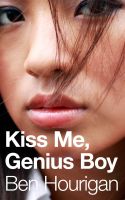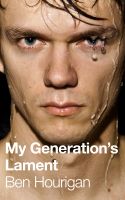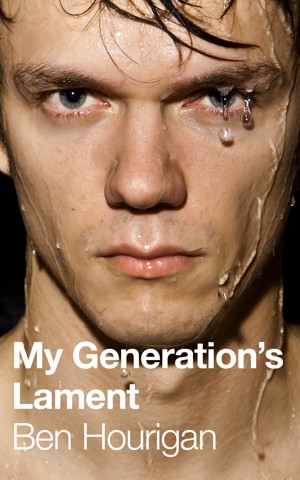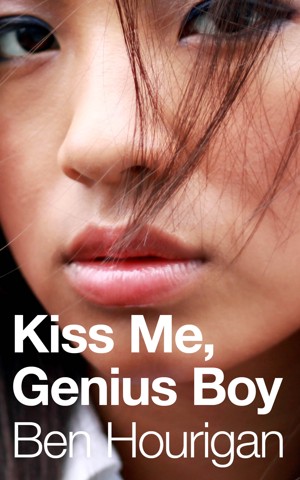Member Since:
Sep. 11, 2011
1 reader has added this author as a 'Favorite Author'.
Ben Hourigan
Biography
I was born in 1981 in Rosebud, a tourist town on the Mornington Peninsula, about an hour and a half's drive from Australia's second-largest city, Melbourne. The son of two art teachers, I grew up in a large house in nearby Tootgarook, filled with books and art and paints and paper and love.
My first novel—Kiss Me, Genius Boy—includes a lot of autobiographical material. It's set in the culturally isolated bayside area where I grew up. Like me, the main character, Joshua Rivers, learned to read very young, and skipped two grades in primary school. He endures a lot of unhappiness in love (all his own fault), but also has some undeserved good luck in that area, which he's frequently ungrateful for. His favorite book and mine are the same: The Dispossessed, by Ursula Le Guin.
But my characters are not exactly me, or the people I know, and the stories I tell aren't exactly the stories of our lives. The kind of fiction I write is a mashup: bits cut out of reality, rearranged and spliced with outright fabrications, in the service of telling a story and exploring the deeper truths in life. In this case, what's fascinated me over the past few years I've been working on this first novel, and the two further volumes of No More Dreams that follow it, is the peril of living solely for one's dream of a perfect future.
I like to read a wide range of things: aside from Le Guin, I'm deeply attached to Kundera, Tolstoy, Laozi, Nietzsche, Kierkegaard, Leonard Cohen, and Ayn Rand. But the author who's influenced me the most is the Japanese Nobel Prize winner Kenzaburo Ôe, author of A Personal Matter and The Silent Cry. It's Ôe that I've taken my present semi-autobiographical approach from, and Ôe that inspired me not to gloss over the ignoble and grotesque things that we think, that we do, and that are done to us and others.
As I grow older, and as I confront the world through art, it strikes me more and more that as humans we are united in suffering, in death, and also in love. My mission as a writer, should I have one, is not just to disseminate whatever small degree of vision or wisdom I may have, but also to remind people that in their alienation and their darkness, they are not alone.
May you find, in the pages I have written for you, something to light your way in the night.
My first novel—Kiss Me, Genius Boy—includes a lot of autobiographical material. It's set in the culturally isolated bayside area where I grew up. Like me, the main character, Joshua Rivers, learned to read very young, and skipped two grades in primary school. He endures a lot of unhappiness in love (all his own fault), but also has some undeserved good luck in that area, which he's frequently ungrateful for. His favorite book and mine are the same: The Dispossessed, by Ursula Le Guin.
But my characters are not exactly me, or the people I know, and the stories I tell aren't exactly the stories of our lives. The kind of fiction I write is a mashup: bits cut out of reality, rearranged and spliced with outright fabrications, in the service of telling a story and exploring the deeper truths in life. In this case, what's fascinated me over the past few years I've been working on this first novel, and the two further volumes of No More Dreams that follow it, is the peril of living solely for one's dream of a perfect future.
I like to read a wide range of things: aside from Le Guin, I'm deeply attached to Kundera, Tolstoy, Laozi, Nietzsche, Kierkegaard, Leonard Cohen, and Ayn Rand. But the author who's influenced me the most is the Japanese Nobel Prize winner Kenzaburo Ôe, author of A Personal Matter and The Silent Cry. It's Ôe that I've taken my present semi-autobiographical approach from, and Ôe that inspired me not to gloss over the ignoble and grotesque things that we think, that we do, and that are done to us and others.
As I grow older, and as I confront the world through art, it strikes me more and more that as humans we are united in suffering, in death, and also in love. My mission as a writer, should I have one, is not just to disseminate whatever small degree of vision or wisdom I may have, but also to remind people that in their alienation and their darkness, they are not alone.
May you find, in the pages I have written for you, something to light your way in the night.
Smashwords Interview
Where to find Ben Hourigan online
Website: http://benhourigan.com
Twitter: @benhourigan
Facebook: Facebook profile
Blog: http://benhourigan.com/blog
Twitter: @benhourigan
Facebook: Facebook profile
Blog: http://benhourigan.com/blog
Series
No More Dreams
by Ben Hourigan
 Kiss Me, Genius Boy (No More Dreams #1)
Kiss Me, Genius Boy (No More Dreams #1)
 My Generation's Lament (No More Dreams #2)
My Generation's Lament (No More Dreams #2)
 Kiss Me, Genius Boy (No More Dreams #1)
Kiss Me, Genius Boy (No More Dreams #1)
Price:
$3.99 USD.
 My Generation's Lament (No More Dreams #2)
My Generation's Lament (No More Dreams #2)
Price:
$3.99 USD.
Books
My Generation's Lament (No More Dreams #2)
by Ben Hourigan
Series: No More Dreams, Book 2.
Price:
$3.99 USD.
Words: 60,690.
Language:
English.
Published: January 5, 2013
by
Nameless Books.
Categories:
Fiction » Literature » Literary, Fiction » Romance » Contemporary
(5.00 from 1 review)
It's been ten years since Joshua Rivers had his dream of the girl he believes he is supposed to marry, and she's still nowhere in sight.
Now twenty-two, Joshua is stuck in a life markedly different from what he expected. Little does Joshua know that by the end of the year he'll have met his destined love at last.
Kiss Me, Genius Boy (No More Dreams #1)
by Ben Hourigan
Series: No More Dreams, Book 1.
Price:
$3.99 USD.
Words: 51,470.
Language:
English.
Published: September 10, 2011
by
Nameless Books.
Categories:
Fiction » Literature » Literary, Fiction » Romance » Contemporary
(5.00 from 1 review)
Joshua Rivers was born to expect great things. A former child prodigy and the son of a lottery winner, he also believes himself blessed with a vision of his perfect destiny and his perfect love. Now in his early twenties, he waits for the moment, and the girl, that will show him his time has finally arrived. And when it does, he resolves to take what is his, whatever it costs him or anyone.


